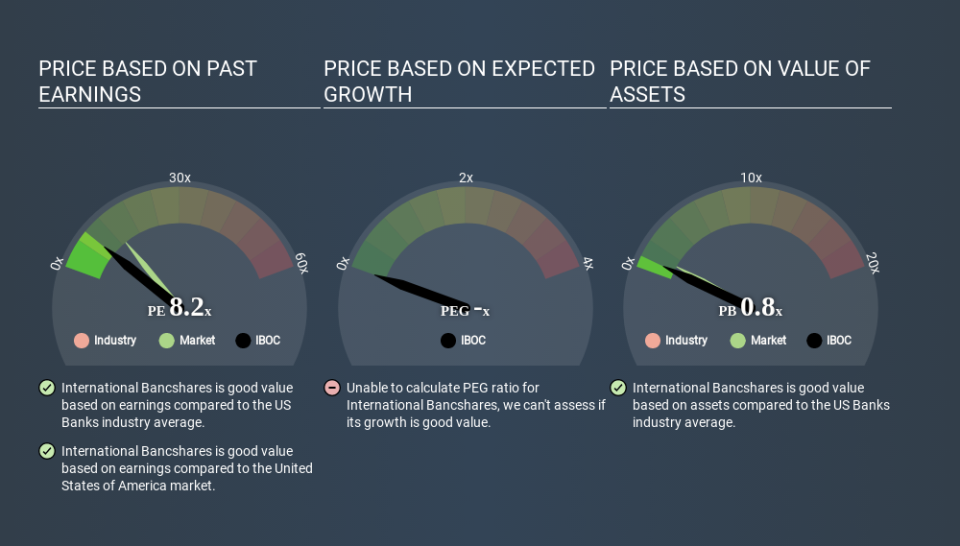A Rising Share Price Has Us Looking Closely At International Bancshares Corporation's (NASDAQ:IBOC) P/E Ratio

International Bancshares (NASDAQ:IBOC) shareholders are no doubt pleased to see that the share price has bounced 39% in the last month alone, although it is still down 40% over the last quarter. But shareholders may not all be feeling jubilant, since the share price is still down 37% in the last year.
All else being equal, a sharp share price increase should make a stock less attractive to potential investors. While the market sentiment towards a stock is very changeable, in the long run, the share price will tend to move in the same direction as earnings per share. So some would prefer to hold off buying when there is a lot of optimism towards a stock. One way to gauge market expectations of a stock is to look at its Price to Earnings Ratio (PE Ratio). Investors have optimistic expectations of companies with higher P/E ratios, compared to companies with lower P/E ratios.
Check out our latest analysis for International Bancshares
How Does International Bancshares's P/E Ratio Compare To Its Peers?
International Bancshares's P/E of 8.19 indicates relatively low sentiment towards the stock. We can see in the image below that the average P/E (8.9) for companies in the banks industry is higher than International Bancshares's P/E.
Its relatively low P/E ratio indicates that International Bancshares shareholders think it will struggle to do as well as other companies in its industry classification. Since the market seems unimpressed with International Bancshares, it's quite possible it could surprise on the upside. You should delve deeper. I like to check if company insiders have been buying or selling.
How Growth Rates Impact P/E Ratios
Earnings growth rates have a big influence on P/E ratios. When earnings grow, the 'E' increases, over time. That means even if the current P/E is high, it will reduce over time if the share price stays flat. So while a stock may look expensive based on past earnings, it could be cheap based on future earnings.
International Bancshares's earnings per share fell by 4.1% in the last twelve months. But it has grown its earnings per share by 6.5% per year over the last five years.
A Limitation: P/E Ratios Ignore Debt and Cash In The Bank
One drawback of using a P/E ratio is that it considers market capitalization, but not the balance sheet. Thus, the metric does not reflect cash or debt held by the company. Theoretically, a business can improve its earnings (and produce a lower P/E in the future) by investing in growth. That means taking on debt (or spending its cash).
While growth expenditure doesn't always pay off, the point is that it is a good option to have; but one that the P/E ratio ignores.
International Bancshares's Balance Sheet
Net debt totals 53% of International Bancshares's market cap. If you want to compare its P/E ratio to other companies, you should absolutely keep in mind it has significant borrowings.
The Verdict On International Bancshares's P/E Ratio
International Bancshares trades on a P/E ratio of 8.2, which is below the US market average of 13.6. When you consider that the company has significant debt, and didn't grow EPS last year, it isn't surprising that the market has muted expectations. What we know for sure is that investors are becoming less uncomfortable about International Bancshares's prospects, since they have pushed its P/E ratio from 5.9 to 8.2 over the last month. If you like to buy stocks that could be turnaround opportunities, then this one might be a candidate; but if you're more sensitive to price, then you may feel the opportunity has passed.
When the market is wrong about a stock, it gives savvy investors an opportunity. If the reality for a company is not as bad as the P/E ratio indicates, then the share price should increase as the market realizes this. Although we don't have analyst forecasts shareholders might want to examine this detailed historical graph of earnings, revenue and cash flow.
Of course you might be able to find a better stock than International Bancshares. So you may wish to see this free collection of other companies that have grown earnings strongly.
If you spot an error that warrants correction, please contact the editor at editorial-team@simplywallst.com. This article by Simply Wall St is general in nature. It does not constitute a recommendation to buy or sell any stock, and does not take account of your objectives, or your financial situation. Simply Wall St has no position in the stocks mentioned.
We aim to bring you long-term focused research analysis driven by fundamental data. Note that our analysis may not factor in the latest price-sensitive company announcements or qualitative material. Thank you for reading.

 Yahoo Finance
Yahoo Finance 
